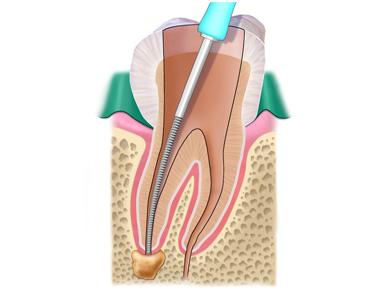
Root Canals: FAQs about treatment that can save your Tooth
Category : Gentalcare
If you have a severely damaged tooth or a genuine tooth infection (abscess), your dentist may suggest a root canal treatment. Root canals are used to fix and save your tooth instead of removing it.
What is a Root Canal?
During root canal therapy, the pulp (or the nerve tissue on the inside canal of the tooth) is removed, the inside of the tooth is cleaned, and then the space inside the tooth is filled and sealed.
What is the pulp and Why does it need to be removed?
The pulp is soft tissue inside your tooth that contains nerves and veins, which provides blood flow to the living tooth structure.
Pulp can become damaged due to:
· A profound cavity
· Repeated dental procedures that disturb this tissue
· A cracked or fractured tooth
· Damage to the tooth
When pulp is damaged, it breaks down, and bacteria begin to multiply within the pulp chamber. The bacteria and other dying pulp remnants can cause an infection, pain, swelling, and ulcers inside the tooth. If the damage is untreated, the tissues around the base of your tooth can form an abscess, a pus-filled pocket that forms at the end of a tooth’s root.
Damaged pulp needs to be removed to eliminate the infection, and to prevent it from spreading, which can put you in danger of losing your tooth totally because bacteria can harm the bone that holds your tooth in place in your jaw. Hence, damaged pulp needs to be removed to avoid infection and other more serious consequences.
Can I get this Treatment done during my regular check-up visit?
No, your dentist will need to schedule a separate follow-up appointment, or they might refer you to a dentist who specializes in root canals and similar procedures dealing with the pulp and tissues surrounding the teeth. This specialist is known as an endodontist.
What should I expect?
A root canal treatment usually takes 1 or 2 office visits to finish. Your dentist will utilize local anesthesia so you don’t feel the procedure. Root canals are used to treat seriously damaged teeth that are often already causing pain. During the procedure you won’t feel any more discomfort than having a regular cavity filled. When the procedure is finished, you should never again feel the torment you felt before having it done.
What will happen before treatment begins?
Your dentist will take X-rays to get a clear perspective on your tooth and the encompassing bone. Then, he/she will numb the zone around your tooth so you are comfortable during the treatment. Finally, they will put a slight sheet of latex rubber over your tooth to keep it dry, and clean during the procedure, protecting the tooth from bacteria and fungus that are normally in the mouth.
What will happen during treatment?
First, your dentist will make an opening in the exposed surface of your tooth. Then, they will take out the pulp, or the tooth’s nerve from inside the tooth and in the regions of the root, known as a root canal. Then, they clean inside the tooth and the root canal. Your dentist may treat the tooth with a germ-killing drug, and fill the root canal with a rubber-like material to seal them against future contamination. Finally, your dentist will place a temporary filling on the tooth to protect it until a definitive restoration like a permanent filling or crown that can be placed at the earliest opportunity.
What will happen after root canal treatment?
Your tooth and the area around it might feel delicate for a couple of days, similar to having a cavity filled. You can request your dentist to prescribe painkillers for pain and discomfort. Your dentist may recommend antibiotics to prevent a risk of infection spread. If so, make sure to use as directed, and follow-up with your dentist if you have any problems taking it.
Your dentist will likely schedule a subsequent visit after the root canal treatment. At this visit, your dentist will take off the temporary filling on the tooth and replace it with a permanent filling or a crown to shield your tooth from further harm. A metal or plastic post may also be placed in the root canal to help make sure the filling materials stay in place. This helps support a crown if you need one.
How long can a root canal filling last?
With proper care, root canal treatments have a high success rate, and your restored tooth can last forever. Make it a point to brush two times every day for two minutes with fluoride toothpaste, clean between your teeth once per day with floss, and see your dentist regularly to make sure your teeth are strong and healthy.

 Review Us
Review Us  Review Us
Review Us 